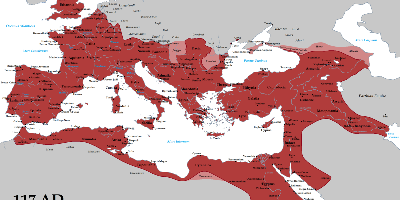Marius Elected Consul (1 janv. 104 av. J.-C. – 31 déc. 100 av. J.-C.)
Description:
Marius was still in Africa when the Assembly elected him consul for 104 BC. At the start of his consulship, Marius returned from Africa in spectacular triumph, bringing Jugurtha and the riches of North Africa to awe the citizenry. Jugurtha, who had prophesied the purchase and destruction of Rome, met his end in the Roman prison after having been led through the streets of the city in chains. Marius was assigned – it is unclear whether by the Assembly or sortition – the province of Gaul to deal with the Cimbric threat.The Cimbri, after their decisive victory at Arausio, marched west into Hispania. Marius was tasked with rebuilding, effectively from scratch, the Gallic legions. Basing his army around a core of trained legionaries from the last year, Marius again secured exemption from the property requirements and with his newly-minted reputation for glorious and profitable victory, raised an army of some thirty thousand Romans and forty thousand Italian allies and auxiliaries. He established a base around the town of Aquae Sextiae and trained his men.
One of his legates was his old quaestor, Sulla, which shows that at this time there was no ill-will between them. In 104 BC, Marius was returned as consul again for 103 BC. Though he could have continued to operate as proconsul, it is likely that the people reelected him as consul so to avoid another incident of disputed command à la Caepio and Mallius. Marius seems to have been able to get exactly what he wanted, and it even seems that his support determined whom the people would elect as his colleagues (his choice was apparently determined, on several occasions, on the basis of their malleability: only Catulus in 102 BC, and Flaccus in 100 BC, would have been serious candidates in their own right without his support, and even Flaccus was described as more servant than partner in the office).
In 103 BC, the Germans still did not emerge from Hispania, and Marius's colleague died, requiring Marius to return to Rome to call elections. Lacking a decisive conclusion to the Cimbrian conflict over the last two years, it was not a foregone conclusion that Marius would win reelection. To that end, he secured a political alliance with a firebrand populist tribune, Lucius Appuleius Saturninus, who with considerable oratorical skill, helped Marius achieve reelection to the consulship for 102 BC.
Marius was reelected to his fourth consecutive consulship as consul for 101 BC with his friend Manius Aquillius as his colleague. After election, he deferred a triumph for Aquae Sextiae, and marched north with his army to join Catulus, whose command was prorogued since Marius' consular colleague was dispatched to defeat the slave revolt in Sicily. Meeting with the Cimbri, the invading tribesmen threatened the Romans with the advance of the Teutones and Ambrones. After informing the Cimbri of their allies' destruction, both sides prepared for battle.
During the year of Marius's sixth consulship (100 BC), Lucius Appuleius Saturninus was tribune of the plebs for the second time and advocated reforms like those earlier put forth by the Gracchi. Saturninus, after assassinating one of his political opponents to the tribunate, pushed for bills that would: drive his former commanding officer Metellus Numidicus into exile, lower the price of wheat distributed by the state, and give colonial lands to the veterans of Marius's recent war. Saturninus' bill gave lands to all veterans of the Cimbric wars, including those of Italian allies, which was resented by some of the plebs urbana. Marius, an Italian, was always supportive of the allies' rights, generously granting citizenship for acts of valour.
The Senate and Marius, however, increasingly opposed Saturninus's measures. Eventually, Saturninus and Glaucia had an opponent, Gaius Memmius, assassinated in the middle of the voting for the consular elections for 99 BC, prompting widespread violence. Called to an emergency session by Marius, the Senate issued its 'final decree' (the Senatus consultum ultimum), and ordered Marius, as consul, to put down the revolt.
Marius, although he was generally allied with the radicals, complied with the request and put down the revolt in the interest of public order. Rallying volunteers from the urban plebs and his veterans, Marius cut the water supply to the Capitoline hill and put Saturinus' barricades under a short and decisive siege. After Saturninus and Glaucia surrendered, Marius attempted to keep Saturninus and his followers alive by locking them safely inside the Senate house, where they would await prosecution according to the law. Possibly with Marius' implied consent, an angry mob broke into the building and, by dislodging the roof tiles and throwing them at the prisoners below, lynched those inside. Glaucia too was dragged from his house and killed in the street.
In complying with the Senate's wishes, Marius tried to show the Senate, who had always been suspicious of his motives, that he was one of them instead of the outsider that Quintus Metellus said he was in 108 BC. Marius's overall concern, for his part, was always how to maintain the Senate's esteem: in the words of the scholar A.N. Sherwin-White, Marius 'wanted to end his days as vir censorius, like the other great worthies among the novi homines of the second century'.
Ajouté au bande de temps:
Date:
1 janv. 104 av. J.-C.
31 déc. 100 av. J.-C.
~ 3 years
